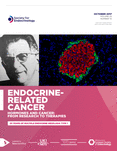Influence of RET mutations on the expression of tyrosine kinases in medullary thyroid carcinoma
- Cristina Rodríguez-Antona1,2,
- Iván Muñoz-Repeto3,
- Lucia Inglada-Pérez1,2,
- Aguirre A de Cubas1,
- Veronika Mancikova1,
- Marta Cañamero4,
- Agnieszka Maliszewska1,
- Álvaro Gómez1,
- Rocío Letón1,
- Luis J Leandro-García1,
- Iñaki Comino-Méndez1,
- Lara Sanchez1,
- Cristina Álvarez-Escolá5,
- Javier Aller6,
- Alberto Cascón1,2 and
- Mercedes Robledo1,2
- 1Hereditary Endocrine Cancer Group, Human Cancer Genetics Programme, Spanish National Cancer Center (CNIO), Melchor Fernández Almagro 3, 28029 Madrid, Spain
2ISCIII Center for Biomedical Research on Rare Diseases (CIBERER), Madrid, Spain
3Pathology Department, Hospital de Fuenlabrada, Madrid, Spain
4Histopathology Core Unit, Biotechnology Programme, Spanish National Cancer Center (CNIO), Madrid, Spain
5Endocrinology Division, Hospital Universitario La Paz, Universidad Autónoma de Madrid, Madrid, Spain
6Endocrinology Service, Hospital Puerta de Hierro, Majadahonda, Madrid, Spain
- (Correspondence should be addressed to M Robledo; Email: mrobledo{at}cnio.es)
Abstract
The therapeutic options for patients with metastatic medullary thyroid carcinoma (MTC) have recently increased due to the development of tyrosine kinase inhibitors (TKIs), some of which have achieved remarkable clinical responses in MTC patients. However, the molecular basis for the large variability in TKI responses is unknown. In this exploratory study, we investigated the expression of eight key TKI target proteins (EGFR, KIT, MET, PDGFRB, VEGF (VEGFA), VEGFR1 (FLT1), VEGFR2 (KDR), and VEGFR3 (FLT4)) by immunohistochemistry in 103 molecularly characterized MTC samples and identified the associated clinical and molecular features. A number of MTC samples exhibited a high expression of VEGFR2 and VEGFR3, which were overexpressed in 57 and 43% of the MTC samples respectively. VEGFR1, PDGFRB, VEGF, KIT, and MET were present in 34–20% of the cases, while EGFR was highly expressed in only 10% of the MTC samples. Some proteins exhibited large differences in expression between sporadic and familial cases, suggesting that different RET mutations may be associated with the immunohistochemical profiles. MTC samples with the C634 RET mutation exhibited a higher expression of VEGFR3 and KIT than the M918T RET-mutated and non-mutated RET tumor samples (P=0.005 and P=0.007 respectively) and a lower expression of VEGFR1 (P=0.04). Non-mutated RET MTC cases exhibited a lower expression of PDGFRB (P=0.04). Overall, this is the first study, to our knowledge, to show that multiple TKI targets are highly expressed in a subset of MTCs, suggesting that molecular stratification of patients may have the potential to improve TKI therapies for MTC.
- medullary thyroid carcinoma
- RET mutation
- tyrosine kinase inhibitors
- EGFR
- KIT
- MET
- PDGFRB
- VEGF
- VEGFR1
- VEGFR2
- VEGFR3
- Revision received 11 June 2013
- Accepted 17 June 2013
- Made available online as an Accepted Preprint 18 June 2013
- © 2013 Society for Endocrinology












